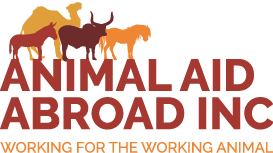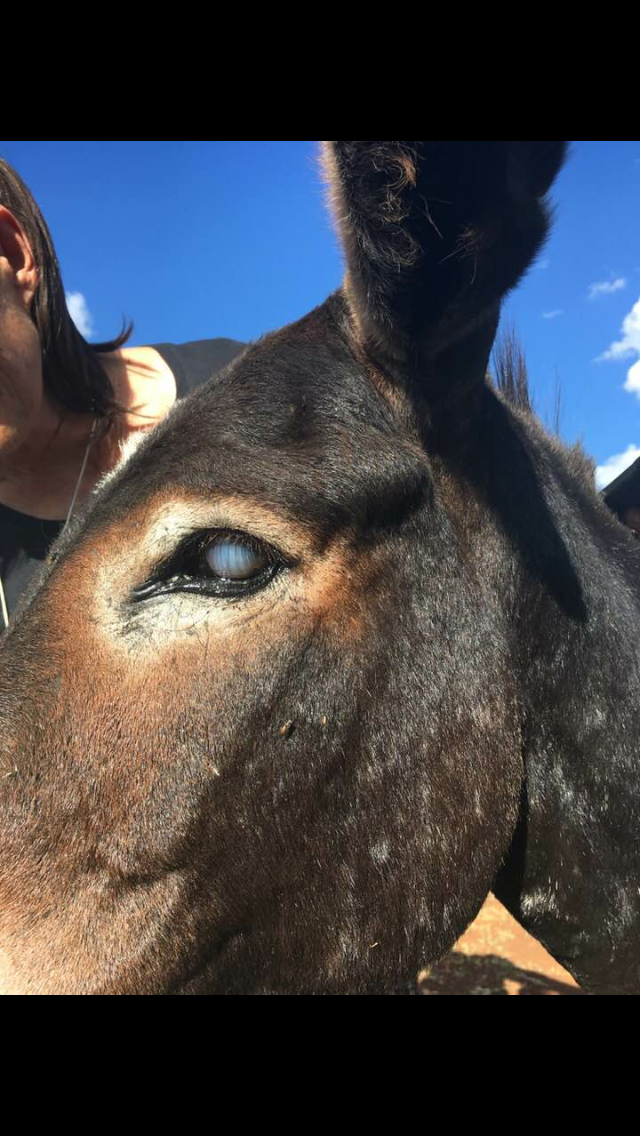Your donations helped to save Merlin's life
Your donations have helped save the life of the following remarkable donkey, Merlin. Matabeleland Animal Rescue & Equine Sanctuary (MARES) tells his story:
MARES first received a call from a very distraught local farmer asking if we could come out to his farm, some 45kms from Bulawayo to collect four donkeys he had confiscated from a wood poacher on his farm. In fact, the farmer, Mr. Moyo, actually came to MARES so that he could come out with us to assist. We hitched our antiquated horse box to the vehicle and set off.
When we arrived we saw 3 donkeys standing huddled together, the harness wounds could be seen from 50m away. Where was the fourth donkey? That’s when we saw the black donkey lying under the tree. Every square inch of his body was covered in abrasions and open septic wounds. We also noticed that he had no tail, it had been chopped off! We tried to lift him but realised he couldn’t stand as both knees had huge, gaping wounds, pus seeping from them. We slipped a sling under him, lifted him carefully and loaded him into the horsebox. The best option was to take him back and euthanize him. After loading him we also loaded the other 3 donkeys and brought all 4 back to the sanctuary for medication and rehabilitation.
But back at the sanctuary, having given him some pain meds for the trip, his eyes were brighter and my groom had told me he had not stopped eating the whole time we were driving, some 2 hours! We started working on his wounds, down both back legs, knees, neck and jaw. He was only able to stand for a couple of minutes before crumpling down. It was then that we saw that all 4 hooves had been worn through! While l sat with him l took a hoof pick and carefully removed pieces of glass and stones from his hooves. Each day we soaked his hooves in Epsom salts then carefully padded and bandaged each hoof and securing thick polystyrene boots which allowed him to not only stand but to walk around as well. Twice a day we flushed out his septic knees and bandaged them as well. Sadly, we realised that he was blind in both eyes, possibly caused from the whip hitting his eyes and detaching the retina, a very common injury to the donkeys. He looked like a circus clown and by the third day, we decided that he was going to live and so named him Merlin, as we knew he would make a magical recovery.
A taxidermy company read the story of Merlin and offered to make him a prosthetic tail to put over his stump so he could swish the flies away with it. 2 weeks after collecting Merlin, a huge abscess that had been forming on the top of his neck burst and with all the pus came a piece of rusty wire, obviously from the ill-fitting strap from the yoke. Today, 4 years after collecting Merlin, we can feel hard lumps along his mane, a harsh reminder to us of how damaged he was.
Fortunately, the owner of the scotch cart that the 4 donkeys had been pulling and had over 1 ton of hardwood firewood in it, tried to retrieve it. What he didn’t count on was the fact that we had the police waiting for him. This was the third cruelty case that we were taking to court. It was at this time that we were introduced to a Ms. Everlasting Chinonda. A Zimbabwean lady who has received a scholarship to study Animal Law in Massachussettes in the United States. She had just completed her degree and returned back to Zimbabwe and opened up her own law company, Speak out for Animals, (SOFA). We told her the story of Merlin and she was happy to do the prosecution on our behalf. It took over a month, with the courts remanding the case three times but the owner of the donkeys was sentenced to 4 years’ imprisonment, 3 years for stealing indigenous wood and 1 year for cruelty to 4 donkeys, AND to have his donkeys confiscated for good. How sad that theft of wood carries a harsher penalty than cruelty to animals!
With so much time spent rehabilitating Merlin, we all fell in love with this exceptional boy and adopted him as the MARES mascot. Merlin remains at MARES where he happily goes out into the special paddock for him and the other 17 blind donkeys and will live out the rest of his days with us. The other 3 donkeys healed well and they were found loving forever homes with 2 families living on farms.
Since winning this court case, MARES together with SOFA, have been fighting to have the sentencing of animal cruelty to be increased. Recently, we have managed to have the fine for cruelty changed from Zimbabwean dollars, $2000.00 (equivalent to US$0.50) to US$ 250.00 per animal. We are still awaiting the sentencing law to pass through parliament.

















